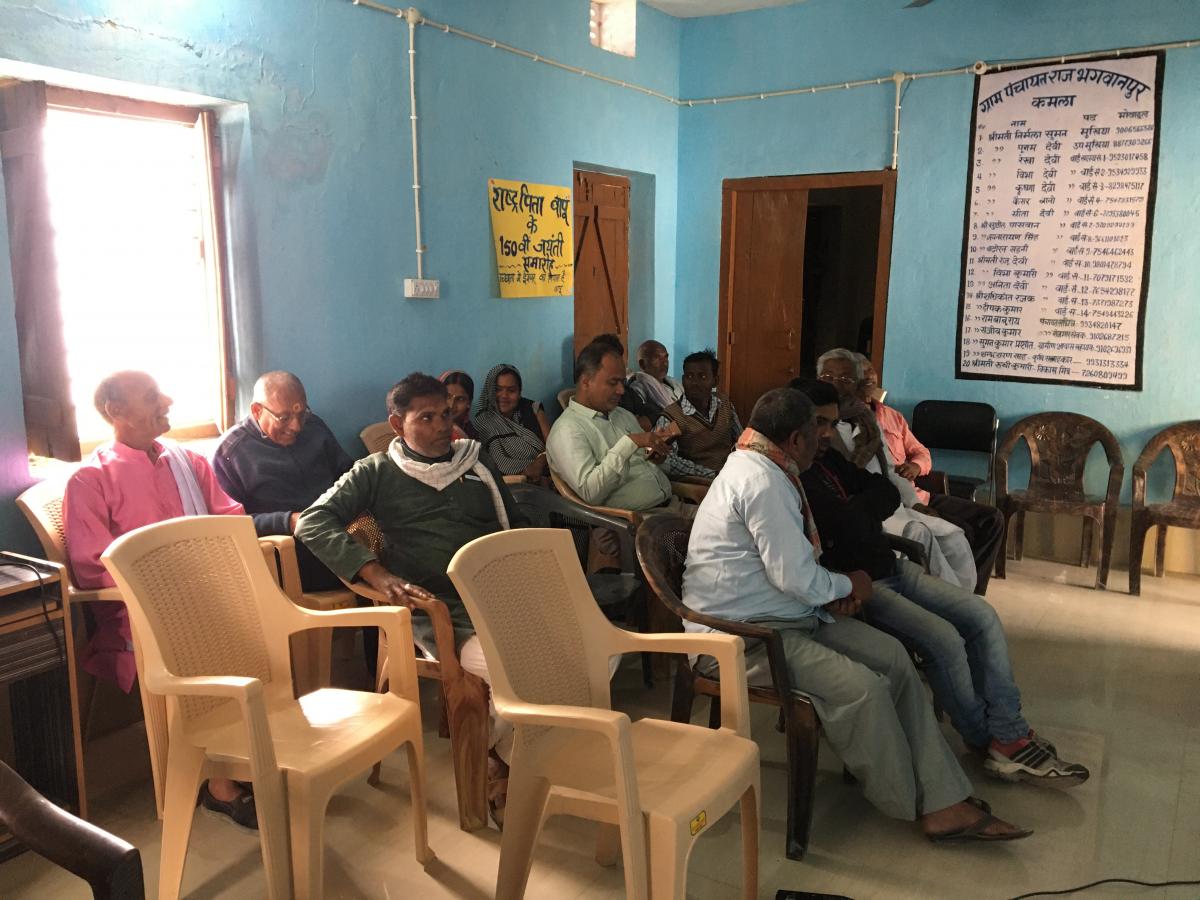Published on: 13/01/2021
Photo caption: Bihar, India: Community members and local government representatives waiting for a meeting to start. Credit: IRC
On 21st August 2020, IRC with the Centre for Budget and Governance Accountability (CBGA) and WaterAid India organised a webinar on Decentralised Public Financing for WASH: Current Situation and Needs During and Beyond the Pandemic. The webinar began with dissemination of the learnings from the collaborative work of the organisations involved on budget tracking of rural and institutional WASH in Bihar and Odisha. This was followed by discussion with an expert panel.
The panel comprised of representatives from the three tiers of the government - national government (Dr. Sanjeeb Kumar Patjoshi, Joint Secretary, Ministry of Panchayat Raj, Government of India), state government (Dr. Ashok Ghosh Chairman of Bihar State Pollution Control Board), and local government (Ms. Ritu Jaiswal , Mukhiya of Singhawahini, Sitamarhi district in Bihar). In addition, the panel included civil society representatives – Mr. Yogesh Kumar from Samarthan, and Ms. Bishaka Banja from National Alliance of Women's Organisations.
The dissemination presentation highlighted that systemic bottlenecks (such as delays in fund flows, poor capacities of local elected governments, and more) led to poor absorption of untied funds available to the local governments (Finance Commission Funds).
The panellists, in their comments to the presentation, made pertinent points, many of which reiterated the findings from the study. These were:
a) There is dire need to strengthen the Gram Panchayat (village local governments)
- For starters, there needs to be clarity on the expectation from a Gram Panchayat – is it supposed to function as an elected local government or an implementation agency?
- Building capacities of Gram Panchayats is a need, unfortunately not a priority in most states.
- In the absence of adequate capacities and clarity, the elected representatives are hesitant to allocate money and ensure its expenditure.
- Untied funds need to remain untied for Gram Panchayats! Local governments are best placed to take development related decisions for their specific needs. Local requirements and people’s demand maybe different from state priorities. Therefore, state guidelines tying/committing resources to certain development issues goes against the grain of decentralised decision-making.
- Gram Panchayats are capable of prioritising and taking key decisions. For instance, the Singhawahini Gram Panchayat in Bihar played a key role in ensuring availability of masks and soaps for everyone to deal with the challenges of COVID-19, in spite of limited resources.
- On the ground planning and decision making need to move away from checking disparate items on a list to a more integrated development approach. This requires adequate understanding of the elected representatives and the Panchayat Secretaries, who work closely with the Gram Panchayats.
- Gram Panchayats need to be trusted, be given power, funds and be made accountable. In the absence of any of these, the role of the Gram Panchayat gets diluted.
b) There is need for greater technical support on the ground
- Typically, engineering is given primacy over community engagement i.e. infrastructure is often given more importance, whereas the processes with communities to ensure use, maintenance and sustainability are often forgotten. This directly impacts the use/life of the facility and hence the services.
- There is crucial need to have technical support available to the Gram Panchayat, to ensure planning of appropriate infrastructure/technology based on the local context.
- In places like Bihar, water quality is a real challenge, however, technology to improve it is not available on the ground.
- Low cost sanitation solutions can prove more expensive in the long run. For instance, in the desperation to achieve Open Defecation Free status, low cost toilets were actively propagated. Such toilets have low acceptance from the community. Further, such toilets are not appropriate for all geographical locations. For instance, in areas of high-water tables such toilets end up contaminating the water source.
c) There is need for integrated thinking
- The multiplicity of agencies concerned in water and sanitation makes seeking accountability difficult.
- The lack of coordination in processes and amongst departments lead to duplication and results in wastage of resources. Whereas, areas where resources are required remain resource starved.
- There need to be (realistic) performance targets at the district level for all the concerned departments and agencies to achieve collectively.
In our work in India, IRC in collaboration with sector partners will continue to take these discussions forward- to inform the duty-bearers of these bottlenecks and challenges - with an intent to strengthen the local institutions to deliver sustainable water and sanitation services.
Read the full report of the webinar below under Resources.
